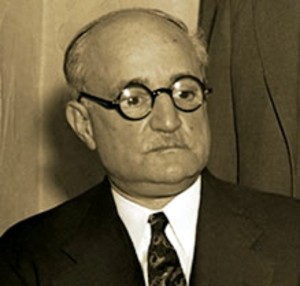Walkabout: A “Musica” Life, Part 4
Read Part 1, Part 2 and Part 3 of this story. In 1936, the Republican Party called on millionaire industrialist Frank Donald Coster of Connecticut to heed the call of destiny and throw his hat in the ring as a candidate for President of the United States. Most people would be flattered by the honor,…


Read Part 1, Part 2 and Part 3 of this story.
In 1936, the Republican Party called on millionaire industrialist Frank Donald Coster of Connecticut to heed the call of destiny and throw his hat in the ring as a candidate for President of the United States. Most people would be flattered by the honor, but Mr. Coster humbly declined. Secretly, he was probably exploding with both pride and horror.
Proud that a man of such humble beginnings as himself would be considered for the honor, proud that he had fooled so many, and abject horror at the thought of the public exposure. Had Coster succumbed to their flattery, he would have become the first Italian-American to run for President. It’s up for debate and historians to determine if he would have been the first con man and thief to run for such high office.
Frank Donald Coster was but one alias in a life of changing names and occupations for this man who had started out in life as Filippo Musica, an Italian-born son of a barber who brought his family to the United States from Naples in 1884, when Filippo was a child. The amazing story of the family’s early life in Little Italy, then Bay Ridge, Brooklyn, is replete with scams and plots to get rich by cutting corners and cheating. The Musica clan preferred to get their money by conning banks and other big money. They always put a respectable face on their endeavors, and they were good enough at it to amass, lose, and regain several sizable fortunes between the beginning of the 20th century and the end of the Great Depression.
The first three parts of our story tell the tales of their scams and plots. The links can be found below. Filippo Musica became Philip Musica as a teenager, and then had several other aliases over the course of the next twenty years. In 1923, he became Frank Donald Coster. He had amassed his latest fortune from selling alcohol-laden hair tonic to bootleggers, who then distilled the liquor out of it. He made so much money doing that during the early years of Prohibition that he was able to buy one of the country’s most prestigious drug manufacturers, McKesson & Roberts, a publicly traded company.
His own company, Girard & Co. was actually the largest bootleg supplier in the Northeast. He merged his company with McKesson & Roberts, and became president of the larger company. Using McKesson’s sterling reputation, Frank Coster continued to run his bootlegging operation from a separate department within McKesson. No one knew about it except a few trusted family members who helped cook the books and run front companies in order to mask the illegal sales. His brothers, and when necessary, his mother and sister, had all been in on the scams at some point in the story.
His brothers were especially invaluable to the con. The next oldest brother, George Musica, became George Dietrich, the treasurer of Girard, and therefore the man who manipulated the books. He knew exactly how much product was going to the bootleggers each month and how much money was coming in. He ran a separate office for the Girard Company end of the business, and was not under the scrutiny of the McKesson treasurers.
The third brother was Arthur. He stayed outside of the drug business, changed his name to George Vernard, and set up an office in Manhattan as a sales office for Girard. It was his job to create the fake purchase orders and invoices that allowed unsuspecting workers at McKesson to fill thousands of orders of alcohol-rich hair and beauty products which did not go to druggists across the country, but to the stills of bootleggers.
The fourth Musica brother, Robert, called himself Robert Dietrich, and he became Girard’s shipping manager. It was his job to take the fake orders coming from George Vernard’s fake sales office and then fill them and ship them out. In actuality, he was shipping the product directly to the bootleggers. He created false bills of lading and on the face of it, it was all very legal and by the books. The bootleggers, which including such legends as Lucky Luciano, never had to sneak around or get midnight deliveries, the goods came to them in broad daylight from a McKesson delivery truck.
McKesson did well during those years, in spite of the Great Depression and Prohibition. The stock continued to gain ground, enabling Frank Coster to buy a bigger mansion and more expensive toys. He got the attention of Republican bigwigs, and they wanted him to run. Today, he wouldn’t have been able to pull it off, plus he wasn’t even technically eligible, as a foreign-born American, but no one vetted anyone back then. They just saw success. But the last thing Frank Coster/Philip Musica wanted was his face plastered all over newspapers and on newsreels.
He had spent decades remaking himself, but he hadn’t changed his face. Law enforcement, the District Attorney’s for whom he had been a snitch, and the government agencies he had spied for during World War I would have recognized him in a heartbeat. So as the new president of McKesson, Frank Coster tried very hard to keep a low profile. No publicity events, no corporate photographs, no charity events. The super-rich guy with the 27 room mansion and the yacht was going to be very publically quiet. The con lasted for four years.
In 1937, it all fell apart.
People who study the great con men of history will tell you that what usually brings them down is greed. The perpetrators are usually incredibly intelligent people who weave an elaborate scheme that could possibly go on fooling people forever, if carefully maintained. But the scheme always falls apart because someone gets greedy and overreaches.
Frank Coster now had more money than he could possibly spend. Prohibition had been incredibly lucrative, and not especially dangerous. He wasn’t in a back alley with tommy guns and barrels of hooch; he was in the executive office of a Wall Street traded firm.
If he kept his records straight and didn’t make waves, the trip may have lasted much longer. But no, he got greedy. Coster played the stock market with McKesson money, and lost, big time. To make up his losses, he began raiding the coffers and moving money around. If his brother George had been treasurer of all of McKesson, he might have been able to ride it out with some clever bookkeeping, but George was only the treasurer of the Girard end of the business. For that matter, Frank Coster was only the president.
He had a board of directors, which included some of the McKesson family members, over him. The legit end of the business started to get suspicious of what was going on in their company.
McKesson’s board of directors met and ordered Coster to convert $2 million in crude drugs to cash in order to build up profits and lower company debt. From the company books, that should have been possible. But Coster’s crude drugs division was only a front for his bootlegging operation. He couldn’t sell anything. He countered the board’s order, and demanded that they make an outside loan for $3 million for “improvements.”
The treasurer of McKesson, Julian Thompson was puzzled. According to his records, much of which were supplied by George Dietrich, the company had enough inventory and cash to not need an outside loan. He started digging around. When Girard had merged with McKesson, the linchpin of the merger was a Dun & Company letter certifying that Girard’s largest client was a company called W.W. Smith & Co. The letter stated that Smith was worth $7 million.
W.W. Smith was actually the dummy company set up to launder the money from the bootlegging operation, and the Dun & Co. letter was a forgery. Julian Thompson focused in on that letter, and decided to double check with Dun & Co., now Dun & Bradstreet. They quickly ascertained that the letter was a forgery. Thompson also discovered that the crude drug division, solely run by Coster, didn’t really exist. He discovered that in 1929, when the market crashed, Coster had covered his stock market losses and propped up his company with $640,000 of McKesson money. In fact, over the years, Coster had actually taken McKesson for over $3 million.
When confronted, Coster accused Thompson of “trying to wreck his company.” He countered by trying to place the company in equity receivership in order to divert Thompson long enough to make good his losses and cover everything up. But Thompkins was just as smart as he was. He had already contacted the board, and they filed for bankruptcy protection under the Chandler Act. The Securities and Exchange Commission came down on them and arrested Coster, and all three of his brothers on December 13, 1937. They were all released on bail pending investigation.
The news of a venerable company like McKesson & Roberts filled the newspapers. They had photographs of the perps coming out of the courtroom and of the principals in the investigation. Frank Coster’s nightmare had come true. His face was plastered all over. The next day, an investigator from the New York State Attorney General’s office was reading his paper and almost spilled his coffee. There on the front page was Frank D. Coster. But he recognized him as his old informant William Johnson, whose real name was Philip Musica.
He got on the phone with the feds and they compared fingerprint cards. The cards told them all they needed to know. On the evening of December 15th, at a late-night press conference, they dropped the bombshell – the president of McKesson Roberts, one of the country’s most important drug companies, was actually two-time convicted con artist Frank Donald Coster, formerly Frank D. Costa, formerly William Johnson, formerly Philip Musica, born Filippo Musica.
Someone called Musica at his home in Fairfield, Ct. to tell him the police were coming. He knew that this time he wouldn’t be able to shake this one off, and he and his brothers would be going to jail for a long time. The bootlegging end of the business would be revealed, and that would result in even more jail time than the fraud and embezzlement. He would end up dying of old age in a federal prison. That would not do.
Philip Musica went upstairs, went into his master bathroom, and stood in his hand carved marble tub and shot himself in the head. He had carefully positioned himself so that his body would fall back in the tub, and no blood would get on the beautiful expensive rugs in the bathroom. He was careful and meticulous to the end. The police were in the driveway when the fatal shot rang out.
The Musica brothers were all arrested in their various homes and states and brought back to New York City. Arthur, who had become George Vernard, was broken at the news of his brother’s suicide. His brother George, acting as George Dietrich for years, was angrier than that. His brother had managed to escape the law, leaving him to hold the bag. He was known to be a bad tempered individual anyway, and had beaten his wife on several occasions, and was always quarrelling with his neighbors. He was looking at years in prison for embezzlement and bootlegging.
Arthur/George Vernard had established his office in Manhattan, and hired a secretary to answer the phone and post letters. The secretary was a Brooklyn woman named Eleonora Lochner. She lived in a tenement on Bushwick Avenue with her mother. She told the New York Post that she had worked for George Vernard for five years. During that time, she was never allowed to open the mail, or write a letter for him. She said all of his mail came from a company called W.W. Smith, with offices in Montreal and Liverpool. She never saw what was in them.
She also told the reporter that Mr. Vernard answered all of his letters to Smith and McKesson himself, and always wrote in longhand and sealed the letters with sealing wax. It was her job to seal his letters, and she said he always stood over her and watched her do it. At the end of the day, he would take all of his letters and mail and lock it into a safe in his office. Miss Lochner handled the company’s accounting and bank accounts, except for the W.W. Smith orders, which Mr. Vernard handled.
She said Vernard always looked nervous, but she never knew why. She also said sometimes another man named Dietrich showed up at the office. They would shut the door and converse in Italian. She always wondered why a man with a German name and a man with a French name would speak in Italian, but it wasn’t her place to question it. He paid her a fair wage, and told her as long as she did what he asked, she would have a job.
In the last days, he grew agitated and despondent. He went to the window of the office and looked out over Manhattan. Vernard turned to her and told her that he wanted to jump. She pulled him away from the window, and he seemed to gather himself. He thanked her, and left the office. The next day he and his brothers were arrested, and she was out of a job. Eleonora Lochner ended her story by telling the reporter that she and her mother would be spending the next day at the relief office, applying for help, as she was now destitute. Ask anyone who has ever been defrauded. It’s always the little people who suffer the most.
Read Part 1, Part 2 and Part 3 of this story.
Top photo: Philip Musica in 1937. Photo via ptskakill.com.





What's Your Take? Leave a Comment